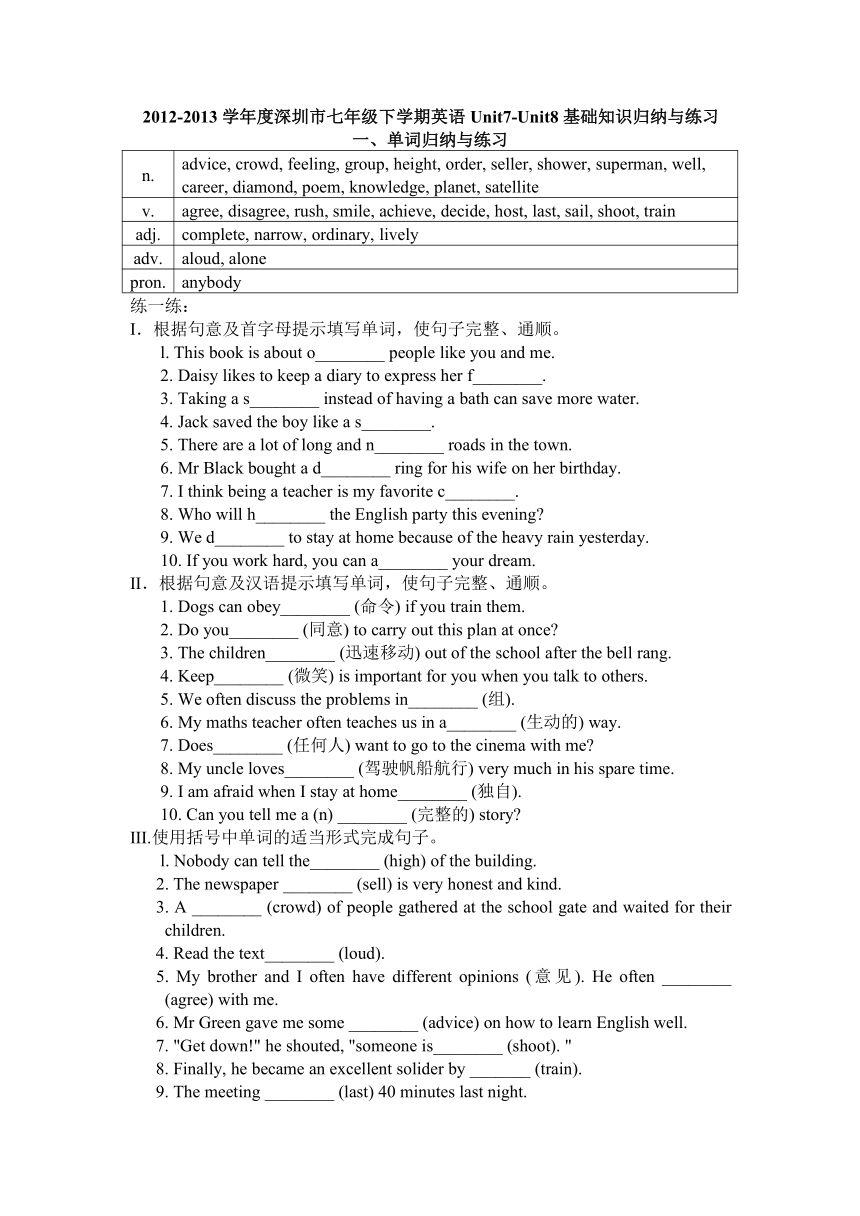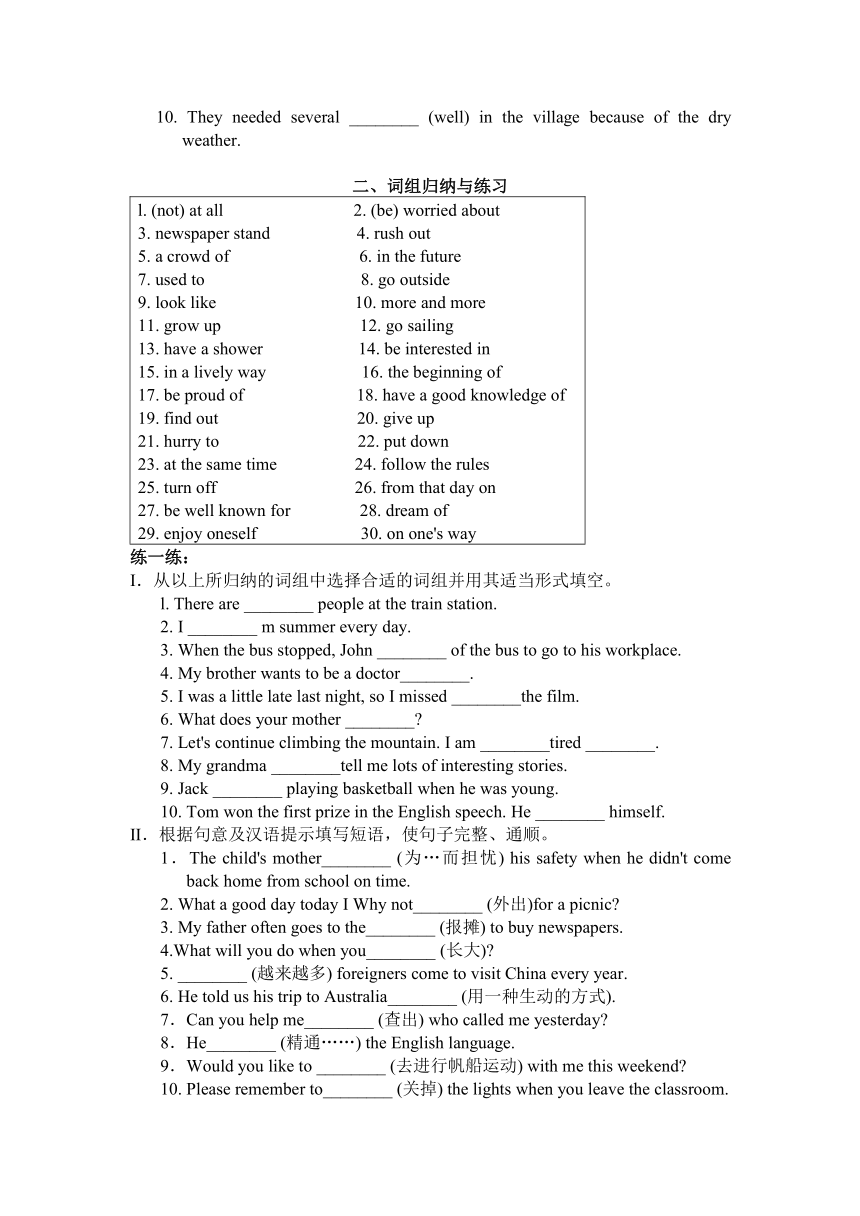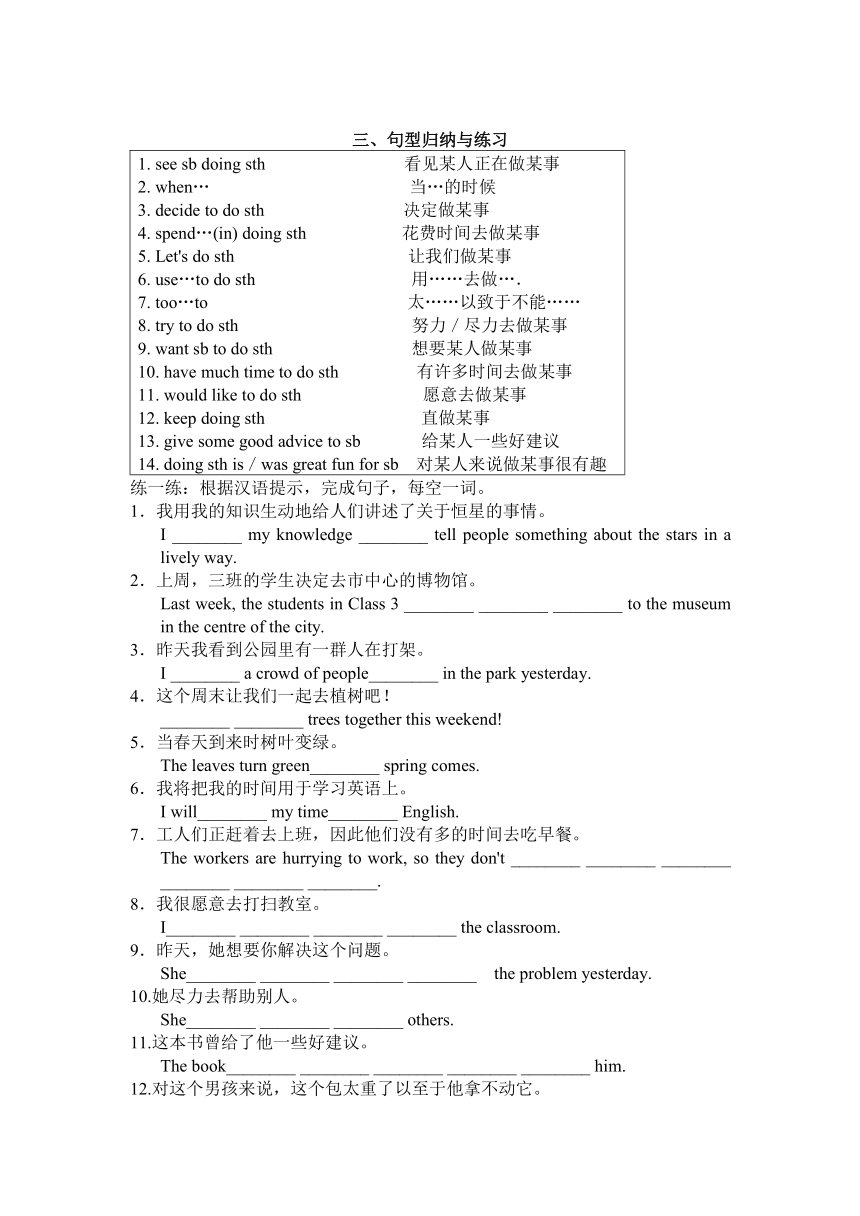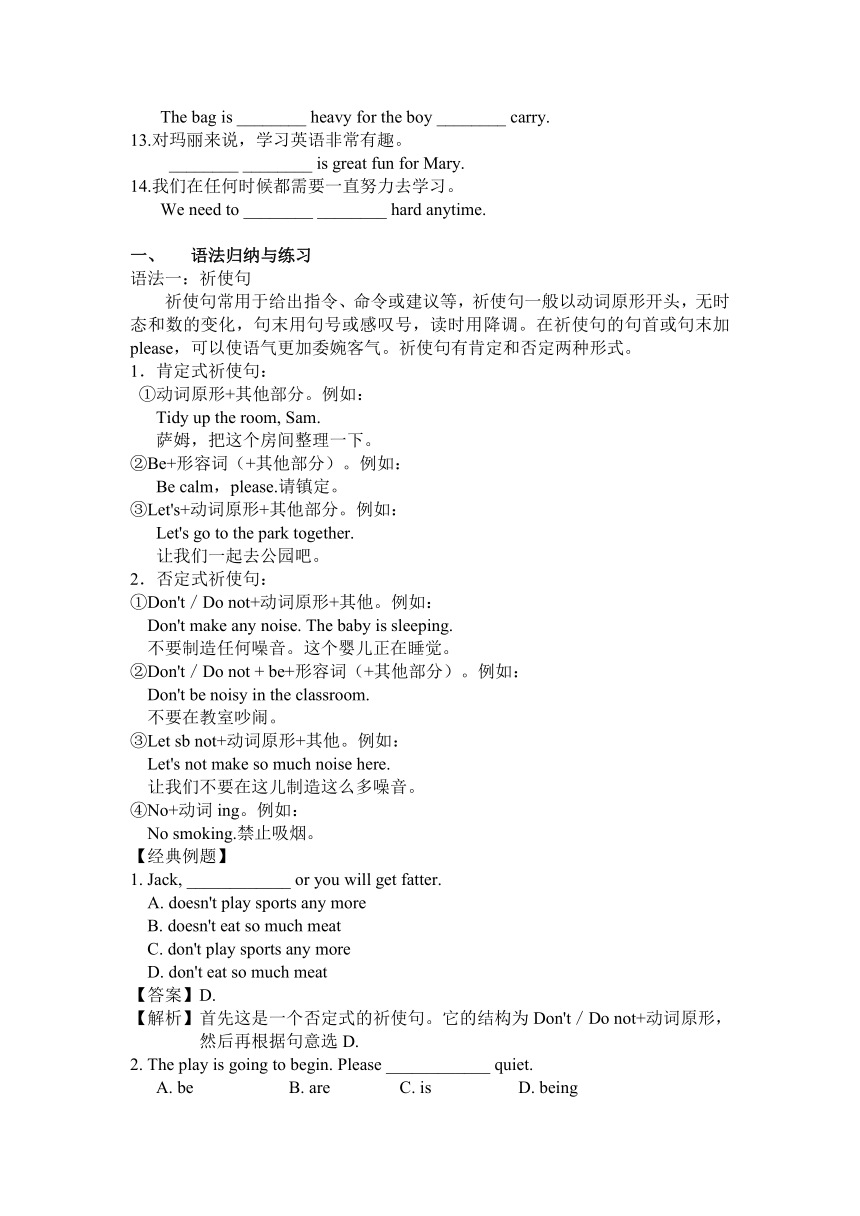2012-2013学年度深圳市七年级下学期英语Unit7-Unit8基础知识归纳与练习
文档属性
| 名称 | 2012-2013学年度深圳市七年级下学期英语Unit7-Unit8基础知识归纳与练习 |  | |
| 格式 | zip | ||
| 文件大小 | 22.7KB | ||
| 资源类型 | 教案 | ||
| 版本资源 | 牛津深圳版 | ||
| 科目 | 英语 | ||
| 更新时间 | 2013-06-13 10:39:00 | ||
图片预览




文档简介
2012-2013学年度深圳市七年级下学期英语Unit7-Unit8基础知识归纳与练习
一、单词归纳与练习
n. advice, crowd, feeling, group, height, order, seller, shower, superman, well,career, diamond, poem, knowledge, planet, satellite
v. agree, disagree, rush, smile, achieve, decide, host, last, sail, shoot, train
adj. complete, narrow, ordinary, lively
adv. aloud, alone
pron. anybody
练一练:
I.根据句意及首字母提示填写单词,使句子完整、通顺。
l. This book is about o________ people like you and me.
2. Daisy likes to keep a diary to express her f________.
3. Taking a s________ instead of having a bath can save more water.
4. Jack saved the boy like a s________.
5. There are a lot of long and n________ roads in the town.
6. Mr Black bought a d________ ring for his wife on her birthday.
7. I think being a teacher is my favorite c________.
8. Who will h________ the English party this evening
9. We d________ to stay at home because of the heavy rain yesterday.
10. If you work hard, you can a________ your dream.
II.根据句意及汉语提示填写单词,使句子完整、通顺。
1. Dogs can obey________ (命令) if you train them.
2. Do you________ (同意) to carry out this plan at once
3. The children________ (迅速移动) out of the school after the bell rang.
4. Keep________ (微笑) is important for you when you talk to others.
5. We often discuss the problems in________ (组).
6. My maths teacher often teaches us in a________ (生动的) way.
7. Does________ (任何人) want to go to the cinema with me
8. My uncle loves________ (驾驶帆船航行) very much in his spare time.
9. I am afraid when I stay at home________ (独自).
10. Can you tell me a (n) ________ (完整的) story
III.使用括号中单词的适当形式完成句子。
l. Nobody can tell the________ (high) of the building.
2. The newspaper ________ (sell) is very honest and kind.
3. A ________ (crowd) of people gathered at the school gate and waited for their children.
4. Read the text________ (loud).
5. My brother and I often have different opinions (意见). He often ________ (agree) with me.
6. Mr Green gave me some ________ (advice) on how to learn English well.
7. "Get down!" he shouted, "someone is________ (shoot). "
8. Finally, he became an excellent solider by _______ (train).
9. The meeting ________ (last) 40 minutes last night.
10. They needed several ________ (well) in the village because of the dry weather.
二、词组归纳与练习
l. (not) at all 2. (be) worried about3. newspaper stand 4. rush out5. a crowd of 6. in the future7. used to 8. go outside9. look like 10. more and more11. grow up 12. go sailing13. have a shower 14. be interested in15. in a lively way 16. the beginning of17. be proud of 18. have a good knowledge of19. find out 20. give up21. hurry to 22. put down23. at the same time 24. follow the rules25. turn off 26. from that day on27. be well known for 28. dream of29. enjoy oneself 30. on one's way
练一练:
I.从以上所归纳的词组中选择合适的词组并用其适当形式填空。
l. There are ________ people at the train station.
2. I ________ m summer every day.
3. When the bus stopped, John ________ of the bus to go to his workplace.
4. My brother wants to be a doctor________.
5. I was a little late last night, so I missed ________the film.
6. What does your mother ________
7. Let's continue climbing the mountain. I am ________tired ________.
8. My grandma ________tell me lots of interesting stories.
9. Jack ________ playing basketball when he was young.
10. Tom won the first prize in the English speech. He ________ himself.
II.根据句意及汉语提示填写短语,使句子完整、通顺。
1.The child's mother________ (为…而担忧) his safety when he didn't come back home from school on time.
2. What a good day today I Why not________ (外出)for a picnic
3. My father often goes to the________ (报摊) to buy newspapers.
4.What will you do when you________ (长大)
5. ________ (越来越多) foreigners come to visit China every year.
6. He told us his trip to Australia________ (用一种生动的方式).
7.Can you help me________ (查出) who called me yesterday
8.He________ (精通……) the English language.
9.Would you like to ________ (去进行帆船运动) with me this weekend
10. Please remember to________ (关掉) the lights when you leave the classroom.
三、句型归纳与练习
1. see sb doing sth 看见某人正在做某事2. when… 当…的时候3. decide to do sth 决定做某事4. spend…(in) doing sth 花费时间去做某事5. Let's do sth 让我们做某事6. use…to do sth 用……去做….7. too…to 太……以致于不能……8. try to do sth 努力/尽力去做某事9. want sb to do sth 想要某人做某事10. have much time to do sth 有许多时间去做某事11. would like to do sth 愿意去做某事12. keep doing sth 直做某事13. give some good advice to sb 给某人一些好建议14. doing sth is/was great fun for sb 对某人来说做某事很有趣
练一练:根据汉语提示,完成句子,每空一词。
1.我用我的知识生动地给人们讲述了关于恒星的事情。
I ________ my knowledge ________ tell people something about the stars in a lively way.
2.上周,三班的学生决定去市中心的博物馆。
Last week, the students in Class 3 ________ ________ ________ to the museum in the centre of the city.
3.昨天我看到公园里有一群人在打架。
I ________ a crowd of people________ in the park yesterday.
4.这个周末让我们一起去植树吧!
________ ________ trees together this weekend!
5.当春天到来时树叶变绿。
The leaves turn green________ spring comes.
6.我将把我的时间用于学习英语上。
I will________ my time________ English.
7.工人们正赶着去上班,因此他们没有多的时间去吃早餐。
The workers are hurrying to work, so they don't ________ ________ ________ ________ ________ ________.
8.我很愿意去打扫教室。
I________ ________ ________ ________ the classroom.
9.昨天,她想要你解决这个问题。
She________ ________ ________ ________ the problem yesterday.
10.她尽力去帮助别人。
She________ ________ ________ others.
11.这本书曾给了他一些好建议。
The book________ ________ ________ ________ ________ him.
12.对这个男孩来说,这个包太重了以至于他拿不动它。
The bag is ________ heavy for the boy ________ carry.
13.对玛丽来说,学习英语非常有趣。
________ ________ is great fun for Mary.
14.我们在任何时候都需要一直努力去学习。
We need to ________ ________ hard anytime.
语法归纳与练习
语法一:祈使句
祈使句常用于给出指令、命令或建议等,祈使句一般以动词原形开头,无时态和数的变化,句末用句号或感叹号,读时用降调。在祈使句的句首或句末加please,可以使语气更加委婉客气。祈使句有肯定和否定两种形式。
1.肯定式祈使句:
①动词原形+其他部分。例如:
Tidy up the room, Sam.
萨姆,把这个房间整理一下。
②Be+形容词(+其他部分)。例如:
Be calm,please.请镇定。
③Let's+动词原形+其他部分。例如:
Let's go to the park together.
让我们一起去公园吧。
2.否定式祈使句:
①Don't/Do not+动词原形+其他。例如:
Don't make any noise. The baby is sleeping.
不要制造任何噪音。这个婴儿正在睡觉。
②Don't/Do not + be+形容词(+其他部分)。例如:
Don't be noisy in the classroom.
不要在教室吵闹。
③Let sb not+动词原形+其他。例如:
Let's not make so much noise here.
让我们不要在这儿制造这么多噪音。
④No+动词ing。例如:
No smoking.禁止吸烟。
【经典例题】
1. Jack, ____________ or you will get fatter.
A. doesn't play sports any more
B. doesn't eat so much meat
C. don't play sports any more
D. don't eat so much meat
【答案】D.
【解析】首先这是一个否定式的祈使句。它的结构为Don't/Do not+动词原形,然后再根据句意选D.
2. The play is going to begin. Please ____________ quiet.
A. be B. are C. is D. being
【答案】A.
【解析】Please放在句首应该是一个祈使句,形容词前应以系动词的原形开头,所以选出A.
语法二:感叹句
感叹句有两种,分别由感叹词what和how引导。具体结构如下:
1. 如果对句中的名词或名词词组表示感叹,用what引导。
①What + a/an+ adj.+单数可数名词+主语+谓语+(其他)!(其中主语和谓语有时可以省略)例如:
What an interesting book (it is)!
它是一本多么有趣的书呀!
②What+ adj.+名词复数/不可数名词+主语+谓语+(其他)!(其中主语和谓语有时可以省略)例如:
What beautiful flowers (they are)!
多么漂亮的花呀!
What good news (it is)!
真是一则好消息!
2.如果对句中的形容词,副词或动词表示感叹,用how引导。
①How + adj./adv.+主语+谓语+(其他)!例如:
How fast the boy ran!
这个男孩跑得真快呀!
②How+主语+谓语+(其他)!例如:
How time flies!
光阴似箭!
【经典例题】
1. ___________ the small town is!
A. What a beautiful B. How beautiful
C. How beautifully D. What beautiful
【答案】B.
【解析】在句中,the small town是主语,is为谓语动词,所以应选用感叹词how,故选B。
2. ___________ good time we had at the party last night!
A. What B. How
C. What a D. How a
【答案】C.
【解析】固定搭配have a good time,根据感叹句的结构应选C。
语法三:when引导的时间状语从句
由when引导的时间状语从句可以发生在主句之前或主句之后。由when引导的时间状语从句可以位于主句之前或主句之后。当时间状语从句位于主句之前时,句中要加逗号。例如:
When I was nine years old, I learnt to swim.
= I learnt to swim when I was nine years old.
当我九岁时,我学会了游泳。
注意:在时间状语从句中,通常不用将来时,而是用现在时表示将来的动作或状态。例如:
1 will tell him everything when he comes back.
当他回来时,我会告诉他一切事情。
【经典例题】
l. Please give my regards to him ___________ you see him.
A. because B. before C. until D. when
【答案】D.
【解析】此题主要考查由when引导的时间状语从句,又根据句意可知选项A、B、C词意不合适,故选D.
2. She ______________you what happened last month when you meet her in Beijing.
A. tell B. told
C. will tell D. am telling
【答案】C.
【解析】从句和主句的劫作都表示将来,在从句中用一般现在时代替一般将来时,而主句仍然用一般将来时,故选C.
语法四:used to & didn't use to
used to + do过去常常;曾经。它表示过去习惯性的动作或状态,但如今已不存在。
1.肯定句:used to+动词原形。例如:
I used to go fishing at the weekend.
我过去常常在周末钓鱼。
2.否定句:did not/ didn't+ use to+动词原形。例如:
I didn't use to go fishing at the weekend.
在周末,我过去常常不钓鱼。
3.一般疑问句:Did+主语+use to+动词原形?例如:
Did you use to go fishing at the weekend
你过去常常在周末钓鱼吗?
Yes, I did. / No, I did not.
是的,我过去常常在周末钓鱼。/不,我过去不常在周末钓鱼。
注意:used to do和be used to doing的区别。be used to doing习惯于做某事。例如:
I am used to taking a walk after supper.
我习惯于在晚饭后散步。
【经典例题】
1. --Did Tom _____________read a lot of books
-- No, he _____________ like reading, but now he enjoys reading.
A. used to; used to
B. use to; used to
C. used to; didn't use to
D. use to; didn't use to
【答案】D.
【解析】第一句问句的开头是did,所以动词要变成原形,排除A和C,后面根据句意可知,要用used to的否定式,所以只能选D。
2. -- Where did your mother work when she was young
-- She _____________ work in a big hospital.
A. used to B. is used to
C. uses to D. used
【答案】A.
【解析】根据前面的问句是问您的妈妈过去曾在哪工作,所以应用used to。
练一练:
I.根据括号里的中文意思填空,使句子完整、通顺。
1.Please _____________ (安静), boys and girls!
2._____________ (关闭) your phone, please.
3._____________ (不要吃) in class, Bill.
4._____________ (让我们玩) together.
5._____________ (禁止拍照) in the museum!
6._____________ (不要迟到) again.
7._____________ (当心)! A car is coming.
8._____________ (让我们不要)use the plastic bags!
II.根据句意,用what(a/an),how填空。
1. _____________ sunny day it is!
2. _____________ excited the children are!
3. _____________ happy boys they are!
4. _____________modern housel
5. _____________ nice jacket Jack is wearing!
6. _____________nice you are!
7. _____________ good advice you gave me!
8. _____________ lazy cats!
9. _____________ hard-working people!
10. _____________ good singers they are!
III.用所给词语的适当形式填空,使句子完整、通顺。
1. When John feels happy, he often _____________ (sing).
2. When she_____________ (go) to the supermarket, she often takes a big bag.
3. When I was young, I often_____________ (fly) kites with my parents.
4. When the boy _____________ (arrive) home, it began to rain.
5. I_____________ (call) you as soon as I get home.
6. Mary didn't finish her homework until her mother_____________ (come) home.
7. Mike used to_____________ (go) to bed at 9 pm. Now he_____________ (go) to bed at 10 pm.
8. John is used to _____________ (have) meals with chopsticks in China.
9. He is _____________ (worry) about the result of his math exam.
10. Did you_____________ (use) to get good marks in your subjects
11. He_____________ (not use) to surf the Internet.
12. I_____________ (not use) to go shopping every week.
13. They_____________ (use) to be good friends.
14. She_____________ (use) to take diet pills.
15. Did they _____________ (use) to go swimming
Units 7-8基础知识归纳与练习Keys: (One possible version)
单词归纳与练习
I. 1. ordinary 2. feelings 3. shower 4. superman 5. narrow 6. diamond 7. career 8. host 9. decided
10. achieve
II. 1. orders 2. agree 3. rushed 4. smiling 5. groups 6. lively 7. anybody 8. sailing 9. alone 10.
complete
III. 1. height 2. seller 3. crowd 4. aloud 5. disagrees 6. advice 7. shooting 8. training 9. lasted 10.
wells
词组归纳与练习
I. 1. a crowd of 2. have a shower 3. rushed out 4. in the future 5. the beginning of 6. look
like 7. not; at all 8. used to 9. was interested in 10. was proud of
II. 1. was worried about 2. go outside 3. newspaper stand 4. grow up 5. More and more
6. in a lively way 7. find out 8. has a good knowledge of 9. go sailing 10. turn off
句型归纳与练习
1. use; to 2. decided to go 3. saw; fighting 4. Let’s plant 5. when 6. spend; learning
7. have much time to have breakfast 8. would like to clean 9. wanted you to solve 10. tries to help 11. gave some good advice to 12. too; to 13. Learning English 14. keep studying
语法归纳与练习
I. 1. be quiet 2. Turn off 3. Don’t eat 4. Let’s play 5. No photos 6. Don’t be late 7. Look out 8. Let’s not
II. 1. What a 2. How 3. What 4. What a 5. What a 6. How 7. What 8. What 9. What
10. What
III. 1. sings 2. goes 3. flew 4. arrived 5. will call 6. came 7. go; goes 8. having 9. worried 10. use 11. didn’t use 12. didn’t use 13. used 14. used 15. use
一、单词归纳与练习
n. advice, crowd, feeling, group, height, order, seller, shower, superman, well,career, diamond, poem, knowledge, planet, satellite
v. agree, disagree, rush, smile, achieve, decide, host, last, sail, shoot, train
adj. complete, narrow, ordinary, lively
adv. aloud, alone
pron. anybody
练一练:
I.根据句意及首字母提示填写单词,使句子完整、通顺。
l. This book is about o________ people like you and me.
2. Daisy likes to keep a diary to express her f________.
3. Taking a s________ instead of having a bath can save more water.
4. Jack saved the boy like a s________.
5. There are a lot of long and n________ roads in the town.
6. Mr Black bought a d________ ring for his wife on her birthday.
7. I think being a teacher is my favorite c________.
8. Who will h________ the English party this evening
9. We d________ to stay at home because of the heavy rain yesterday.
10. If you work hard, you can a________ your dream.
II.根据句意及汉语提示填写单词,使句子完整、通顺。
1. Dogs can obey________ (命令) if you train them.
2. Do you________ (同意) to carry out this plan at once
3. The children________ (迅速移动) out of the school after the bell rang.
4. Keep________ (微笑) is important for you when you talk to others.
5. We often discuss the problems in________ (组).
6. My maths teacher often teaches us in a________ (生动的) way.
7. Does________ (任何人) want to go to the cinema with me
8. My uncle loves________ (驾驶帆船航行) very much in his spare time.
9. I am afraid when I stay at home________ (独自).
10. Can you tell me a (n) ________ (完整的) story
III.使用括号中单词的适当形式完成句子。
l. Nobody can tell the________ (high) of the building.
2. The newspaper ________ (sell) is very honest and kind.
3. A ________ (crowd) of people gathered at the school gate and waited for their children.
4. Read the text________ (loud).
5. My brother and I often have different opinions (意见). He often ________ (agree) with me.
6. Mr Green gave me some ________ (advice) on how to learn English well.
7. "Get down!" he shouted, "someone is________ (shoot). "
8. Finally, he became an excellent solider by _______ (train).
9. The meeting ________ (last) 40 minutes last night.
10. They needed several ________ (well) in the village because of the dry weather.
二、词组归纳与练习
l. (not) at all 2. (be) worried about3. newspaper stand 4. rush out5. a crowd of 6. in the future7. used to 8. go outside9. look like 10. more and more11. grow up 12. go sailing13. have a shower 14. be interested in15. in a lively way 16. the beginning of17. be proud of 18. have a good knowledge of19. find out 20. give up21. hurry to 22. put down23. at the same time 24. follow the rules25. turn off 26. from that day on27. be well known for 28. dream of29. enjoy oneself 30. on one's way
练一练:
I.从以上所归纳的词组中选择合适的词组并用其适当形式填空。
l. There are ________ people at the train station.
2. I ________ m summer every day.
3. When the bus stopped, John ________ of the bus to go to his workplace.
4. My brother wants to be a doctor________.
5. I was a little late last night, so I missed ________the film.
6. What does your mother ________
7. Let's continue climbing the mountain. I am ________tired ________.
8. My grandma ________tell me lots of interesting stories.
9. Jack ________ playing basketball when he was young.
10. Tom won the first prize in the English speech. He ________ himself.
II.根据句意及汉语提示填写短语,使句子完整、通顺。
1.The child's mother________ (为…而担忧) his safety when he didn't come back home from school on time.
2. What a good day today I Why not________ (外出)for a picnic
3. My father often goes to the________ (报摊) to buy newspapers.
4.What will you do when you________ (长大)
5. ________ (越来越多) foreigners come to visit China every year.
6. He told us his trip to Australia________ (用一种生动的方式).
7.Can you help me________ (查出) who called me yesterday
8.He________ (精通……) the English language.
9.Would you like to ________ (去进行帆船运动) with me this weekend
10. Please remember to________ (关掉) the lights when you leave the classroom.
三、句型归纳与练习
1. see sb doing sth 看见某人正在做某事2. when… 当…的时候3. decide to do sth 决定做某事4. spend…(in) doing sth 花费时间去做某事5. Let's do sth 让我们做某事6. use…to do sth 用……去做….7. too…to 太……以致于不能……8. try to do sth 努力/尽力去做某事9. want sb to do sth 想要某人做某事10. have much time to do sth 有许多时间去做某事11. would like to do sth 愿意去做某事12. keep doing sth 直做某事13. give some good advice to sb 给某人一些好建议14. doing sth is/was great fun for sb 对某人来说做某事很有趣
练一练:根据汉语提示,完成句子,每空一词。
1.我用我的知识生动地给人们讲述了关于恒星的事情。
I ________ my knowledge ________ tell people something about the stars in a lively way.
2.上周,三班的学生决定去市中心的博物馆。
Last week, the students in Class 3 ________ ________ ________ to the museum in the centre of the city.
3.昨天我看到公园里有一群人在打架。
I ________ a crowd of people________ in the park yesterday.
4.这个周末让我们一起去植树吧!
________ ________ trees together this weekend!
5.当春天到来时树叶变绿。
The leaves turn green________ spring comes.
6.我将把我的时间用于学习英语上。
I will________ my time________ English.
7.工人们正赶着去上班,因此他们没有多的时间去吃早餐。
The workers are hurrying to work, so they don't ________ ________ ________ ________ ________ ________.
8.我很愿意去打扫教室。
I________ ________ ________ ________ the classroom.
9.昨天,她想要你解决这个问题。
She________ ________ ________ ________ the problem yesterday.
10.她尽力去帮助别人。
She________ ________ ________ others.
11.这本书曾给了他一些好建议。
The book________ ________ ________ ________ ________ him.
12.对这个男孩来说,这个包太重了以至于他拿不动它。
The bag is ________ heavy for the boy ________ carry.
13.对玛丽来说,学习英语非常有趣。
________ ________ is great fun for Mary.
14.我们在任何时候都需要一直努力去学习。
We need to ________ ________ hard anytime.
语法归纳与练习
语法一:祈使句
祈使句常用于给出指令、命令或建议等,祈使句一般以动词原形开头,无时态和数的变化,句末用句号或感叹号,读时用降调。在祈使句的句首或句末加please,可以使语气更加委婉客气。祈使句有肯定和否定两种形式。
1.肯定式祈使句:
①动词原形+其他部分。例如:
Tidy up the room, Sam.
萨姆,把这个房间整理一下。
②Be+形容词(+其他部分)。例如:
Be calm,please.请镇定。
③Let's+动词原形+其他部分。例如:
Let's go to the park together.
让我们一起去公园吧。
2.否定式祈使句:
①Don't/Do not+动词原形+其他。例如:
Don't make any noise. The baby is sleeping.
不要制造任何噪音。这个婴儿正在睡觉。
②Don't/Do not + be+形容词(+其他部分)。例如:
Don't be noisy in the classroom.
不要在教室吵闹。
③Let sb not+动词原形+其他。例如:
Let's not make so much noise here.
让我们不要在这儿制造这么多噪音。
④No+动词ing。例如:
No smoking.禁止吸烟。
【经典例题】
1. Jack, ____________ or you will get fatter.
A. doesn't play sports any more
B. doesn't eat so much meat
C. don't play sports any more
D. don't eat so much meat
【答案】D.
【解析】首先这是一个否定式的祈使句。它的结构为Don't/Do not+动词原形,然后再根据句意选D.
2. The play is going to begin. Please ____________ quiet.
A. be B. are C. is D. being
【答案】A.
【解析】Please放在句首应该是一个祈使句,形容词前应以系动词的原形开头,所以选出A.
语法二:感叹句
感叹句有两种,分别由感叹词what和how引导。具体结构如下:
1. 如果对句中的名词或名词词组表示感叹,用what引导。
①What + a/an+ adj.+单数可数名词+主语+谓语+(其他)!(其中主语和谓语有时可以省略)例如:
What an interesting book (it is)!
它是一本多么有趣的书呀!
②What+ adj.+名词复数/不可数名词+主语+谓语+(其他)!(其中主语和谓语有时可以省略)例如:
What beautiful flowers (they are)!
多么漂亮的花呀!
What good news (it is)!
真是一则好消息!
2.如果对句中的形容词,副词或动词表示感叹,用how引导。
①How + adj./adv.+主语+谓语+(其他)!例如:
How fast the boy ran!
这个男孩跑得真快呀!
②How+主语+谓语+(其他)!例如:
How time flies!
光阴似箭!
【经典例题】
1. ___________ the small town is!
A. What a beautiful B. How beautiful
C. How beautifully D. What beautiful
【答案】B.
【解析】在句中,the small town是主语,is为谓语动词,所以应选用感叹词how,故选B。
2. ___________ good time we had at the party last night!
A. What B. How
C. What a D. How a
【答案】C.
【解析】固定搭配have a good time,根据感叹句的结构应选C。
语法三:when引导的时间状语从句
由when引导的时间状语从句可以发生在主句之前或主句之后。由when引导的时间状语从句可以位于主句之前或主句之后。当时间状语从句位于主句之前时,句中要加逗号。例如:
When I was nine years old, I learnt to swim.
= I learnt to swim when I was nine years old.
当我九岁时,我学会了游泳。
注意:在时间状语从句中,通常不用将来时,而是用现在时表示将来的动作或状态。例如:
1 will tell him everything when he comes back.
当他回来时,我会告诉他一切事情。
【经典例题】
l. Please give my regards to him ___________ you see him.
A. because B. before C. until D. when
【答案】D.
【解析】此题主要考查由when引导的时间状语从句,又根据句意可知选项A、B、C词意不合适,故选D.
2. She ______________you what happened last month when you meet her in Beijing.
A. tell B. told
C. will tell D. am telling
【答案】C.
【解析】从句和主句的劫作都表示将来,在从句中用一般现在时代替一般将来时,而主句仍然用一般将来时,故选C.
语法四:used to & didn't use to
used to + do过去常常;曾经。它表示过去习惯性的动作或状态,但如今已不存在。
1.肯定句:used to+动词原形。例如:
I used to go fishing at the weekend.
我过去常常在周末钓鱼。
2.否定句:did not/ didn't+ use to+动词原形。例如:
I didn't use to go fishing at the weekend.
在周末,我过去常常不钓鱼。
3.一般疑问句:Did+主语+use to+动词原形?例如:
Did you use to go fishing at the weekend
你过去常常在周末钓鱼吗?
Yes, I did. / No, I did not.
是的,我过去常常在周末钓鱼。/不,我过去不常在周末钓鱼。
注意:used to do和be used to doing的区别。be used to doing习惯于做某事。例如:
I am used to taking a walk after supper.
我习惯于在晚饭后散步。
【经典例题】
1. --Did Tom _____________read a lot of books
-- No, he _____________ like reading, but now he enjoys reading.
A. used to; used to
B. use to; used to
C. used to; didn't use to
D. use to; didn't use to
【答案】D.
【解析】第一句问句的开头是did,所以动词要变成原形,排除A和C,后面根据句意可知,要用used to的否定式,所以只能选D。
2. -- Where did your mother work when she was young
-- She _____________ work in a big hospital.
A. used to B. is used to
C. uses to D. used
【答案】A.
【解析】根据前面的问句是问您的妈妈过去曾在哪工作,所以应用used to。
练一练:
I.根据括号里的中文意思填空,使句子完整、通顺。
1.Please _____________ (安静), boys and girls!
2._____________ (关闭) your phone, please.
3._____________ (不要吃) in class, Bill.
4._____________ (让我们玩) together.
5._____________ (禁止拍照) in the museum!
6._____________ (不要迟到) again.
7._____________ (当心)! A car is coming.
8._____________ (让我们不要)use the plastic bags!
II.根据句意,用what(a/an),how填空。
1. _____________ sunny day it is!
2. _____________ excited the children are!
3. _____________ happy boys they are!
4. _____________modern housel
5. _____________ nice jacket Jack is wearing!
6. _____________nice you are!
7. _____________ good advice you gave me!
8. _____________ lazy cats!
9. _____________ hard-working people!
10. _____________ good singers they are!
III.用所给词语的适当形式填空,使句子完整、通顺。
1. When John feels happy, he often _____________ (sing).
2. When she_____________ (go) to the supermarket, she often takes a big bag.
3. When I was young, I often_____________ (fly) kites with my parents.
4. When the boy _____________ (arrive) home, it began to rain.
5. I_____________ (call) you as soon as I get home.
6. Mary didn't finish her homework until her mother_____________ (come) home.
7. Mike used to_____________ (go) to bed at 9 pm. Now he_____________ (go) to bed at 10 pm.
8. John is used to _____________ (have) meals with chopsticks in China.
9. He is _____________ (worry) about the result of his math exam.
10. Did you_____________ (use) to get good marks in your subjects
11. He_____________ (not use) to surf the Internet.
12. I_____________ (not use) to go shopping every week.
13. They_____________ (use) to be good friends.
14. She_____________ (use) to take diet pills.
15. Did they _____________ (use) to go swimming
Units 7-8基础知识归纳与练习Keys: (One possible version)
单词归纳与练习
I. 1. ordinary 2. feelings 3. shower 4. superman 5. narrow 6. diamond 7. career 8. host 9. decided
10. achieve
II. 1. orders 2. agree 3. rushed 4. smiling 5. groups 6. lively 7. anybody 8. sailing 9. alone 10.
complete
III. 1. height 2. seller 3. crowd 4. aloud 5. disagrees 6. advice 7. shooting 8. training 9. lasted 10.
wells
词组归纳与练习
I. 1. a crowd of 2. have a shower 3. rushed out 4. in the future 5. the beginning of 6. look
like 7. not; at all 8. used to 9. was interested in 10. was proud of
II. 1. was worried about 2. go outside 3. newspaper stand 4. grow up 5. More and more
6. in a lively way 7. find out 8. has a good knowledge of 9. go sailing 10. turn off
句型归纳与练习
1. use; to 2. decided to go 3. saw; fighting 4. Let’s plant 5. when 6. spend; learning
7. have much time to have breakfast 8. would like to clean 9. wanted you to solve 10. tries to help 11. gave some good advice to 12. too; to 13. Learning English 14. keep studying
语法归纳与练习
I. 1. be quiet 2. Turn off 3. Don’t eat 4. Let’s play 5. No photos 6. Don’t be late 7. Look out 8. Let’s not
II. 1. What a 2. How 3. What 4. What a 5. What a 6. How 7. What 8. What 9. What
10. What
III. 1. sings 2. goes 3. flew 4. arrived 5. will call 6. came 7. go; goes 8. having 9. worried 10. use 11. didn’t use 12. didn’t use 13. used 14. used 15. use
